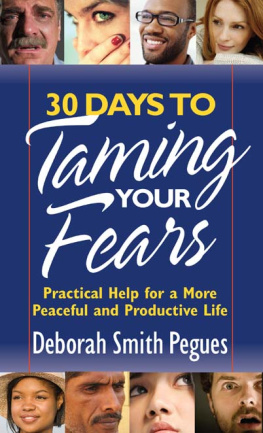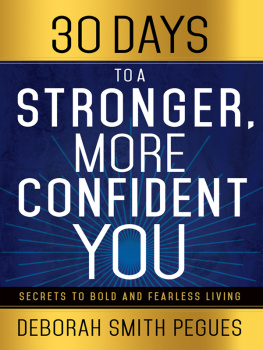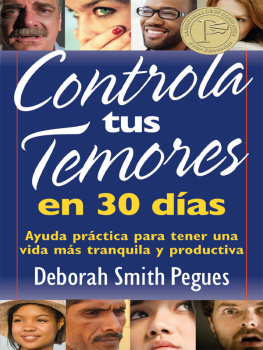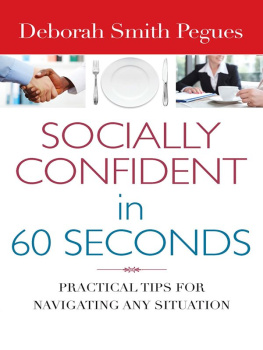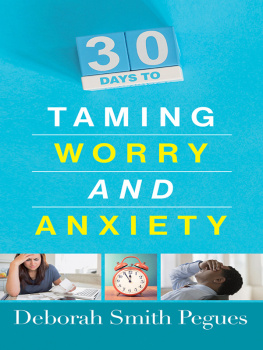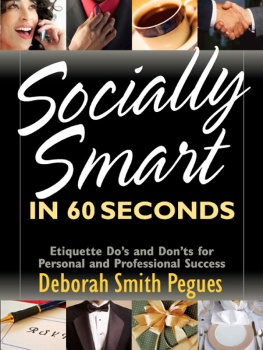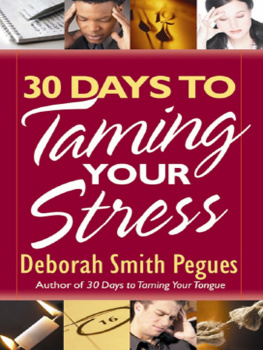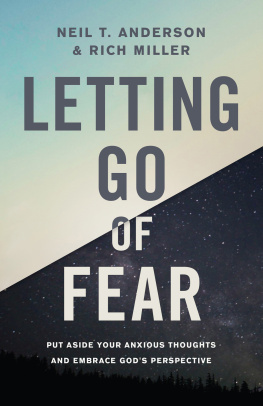
Deborah Smith Pegues

HARVEST HOUSE PUBLISHERS
EUGENE, OREGON
Unless otherwise indicated, all Scripture quotations are from the New King James Version. Copyright 1982 by Thomas Nelson, Inc. Used by permission. All rights reserved.
Verses marked NLT are from the Holy Bible, New Living Translation, copyright 1996, 2004. Used by permission of Tyndale House Publishers, Inc., Wheaton, IL 60189 USA. All rights reserved.
Verses marked NIV are from the Holy Bible, New International Version, NIV. Copyright 1973, 1978, 1984, 2011 by Biblica, Inc.TM All rights reserved worldwide. Used by permission.
Verses marked KJV are from the King James Version.
Cover design by Koechel Peterson & Associates, Inc., Minneapolis, Minnesota
Cover photos Thinkstock
This book contains stories in which the author has changed peoples names and some details of their situations in order to protect their privacy.
30 Days to Taming Your Fears
Copyright 2011 by Deborah Smith Pegues
Published by Harvest House Publishers
Eugene, Oregon 97402
www.harvesthousepublishers.com
ISBN 978-0-7369-2041-4 (pbk.)
ISBN 978-0-7369-4140-2 (eBook)
All rights reserved. No part of this publication may be reproduced, stored in a retrieval system, or transmitted in any form or by any meanselectronic, mechanical, digital, photocopy, recording, or any otherexcept for brief quotations in printed reviews, without the prior permission of the publisher.
Printed in the United States of America
11 12 13 14 15 16 17 18 / BP-NI / 10 9 8 7 6 5 4 3 2 1
This book is dedicated to every reader
who will decide to take authority
over the spirit of fear and lead a
more peaceful and productive life.
Contents
I offer special thanks to my friends at Zoe Christian Fellowship (ZCF) of Whittier, California, for their prayers and support of this project: Pastor Edward and Vanessa Smith, Kelvin and Delisa Kelley, Ralph and Cathy Lawson, Michael and Lois Douglas, Ronald and Redelia Fowler, and the entire ZCF family.
I am indebted to Roberta Morris and Diane Gardner who unselfishly offered their time and talent to review the manuscript; their input was invaluable. Billie Rodgers, Belinda Wallace, Cheryl Martin, Alvin and Pam Kelley, John Patton, Carol Pegues, and Creola Waters played a critical role through their prayers, input, and inspiration. I am extremely grateful for the following family members whose support facilitated my writing schedule: Rube and Gina Smith, Bobby Smith, and Gene Smith.
My Harvest House dream team continues to stoke the fires of inspiration. Thanks to President Bob Hawkins for your humility and leadership, acquisitions editor Terry Glaspey for your endless ideas and motivation, senior editor Rod Morris for your passion for correct interpretation and application of the Scriptures, and the entire staff for your commitment to excellence.
Finally, the faithfulness and support of my loving husband, Darnell, is a testimony of Gods goodness.
As I write this, its been five nights since my husband, Darnell, left for Kansas City to visit his ailing brother; however, it seems much longer because Ive spent each night alone in our homea major accomplishment for me in over thirty-two years of marriage! Until now, I just couldnt bring myself to do it. The fact that wed had a burglary a few years ago only added to my apprehension. At the time, I thought I would always experience anxiety when entering our homeespecially the master bedroom from which major items had been stolen. However, by the grace of God, I took immediate and proactive steps to overcome my fear and have enjoyed many restful nights sincewith Darnell by my side of course.
Now, when I decided to write a book on how to tame fears, I thought it would be downright hypocritical to proclaim life-changing principles and strategies on how to neutralize fears and not practice them myself. So, for the sake of integrity and my own deliverance, here I sithome alonelate at night. So far so good.
Darnell is due back tomorrow. Ive already resisted the temptation to work all night over the past few days to avoid going to bed during the hours of darkness. I also did not ask a friend to stay with me, nor did I choose to spend the time at one of my many relatives. While I have had a few bouts of nighttime anxiety, I have already declared my victory since my goal was not to allow fear to dictate my behavior. I now know that I can and will stay home alone again when Darnell has to leave townfor I was not alone. I have meditated on and recited Psalm 91:11 so many times over the past five nights that a scan of my brain would probably show these words: For he will command his angels concerning you to guard you in all your ways ( NIV ).
Fear is perhaps the oldest emotion known to mankind. Over the years, it has often been my greatest friendand my greatest enemy. I was raised in a strict Pentecostal environment in the Deep South. My pastor, parents, and Sunday school teachers constantly warned that Jesus could return to the earth at any moment to catch away His people. They cautioned that anyone He found committing any kind of sin would face eternal damnation; there would be no mercy. When I went away to college and experienced freedom from parental control, the fear of burning in a lake of fire and brimstone haunted me like a ghost.
In retrospect, I realize that this fear worked to my advantage. It was a real deterrent to the temptations that surrounded me: illicit drugs, sex, and wild parties, to name a few. However, once I graduated, moved to the big city (Los Angeles), and started a life on my own, I faced a host of debilitating fears. These fears were an enemy to my quality of life: fear of flying to my corporate assignments, fear of living in an apartment all alone, fear that every man I met was a wolf in sheeps clothing, fear that any day a major earthquake would swallow up Los Angeles, fear of crossing over a tall bridge. On and on went the torment.
Let me hasten to say that fear is not always a bad thing. Fear is a natural response to real or perceived danger. Healthy fear causes us to lock our car doors, buy alarm systems, and look both ways before crossing the street. Fear becomes unhealthy, however, when it controls our behavior and keeps us from doing positive things. Fear is learned behavior. We can learn it from childhood conditioning, personal experience, observation of other peoples experience, media exposure, or other channels of information. Over the years, my apprehensions and trepidations learned through all these channels have been persistent; however, I have been equally persistent in my quest to overcome them.
Although I will generally use the term fears throughout the book, not all fears are created equally. Rather, they come in various degrees of intensity: anxieties, fears, and phobias. Let me explain the differences. Anxiety is the dread of a potential danger or loss in the future (e.g., possible terrorist attack); fear is the emotional response to a real or perceived present danger or threat (e.g., being followed); and a phobia is a fear gone wild. It is an irrational dread (e.g., fear of elevators) that seeks to avoid repeating a negative experience.
Ive modeled the pattern. I saw my fear of earthquakes progress from
Next page
